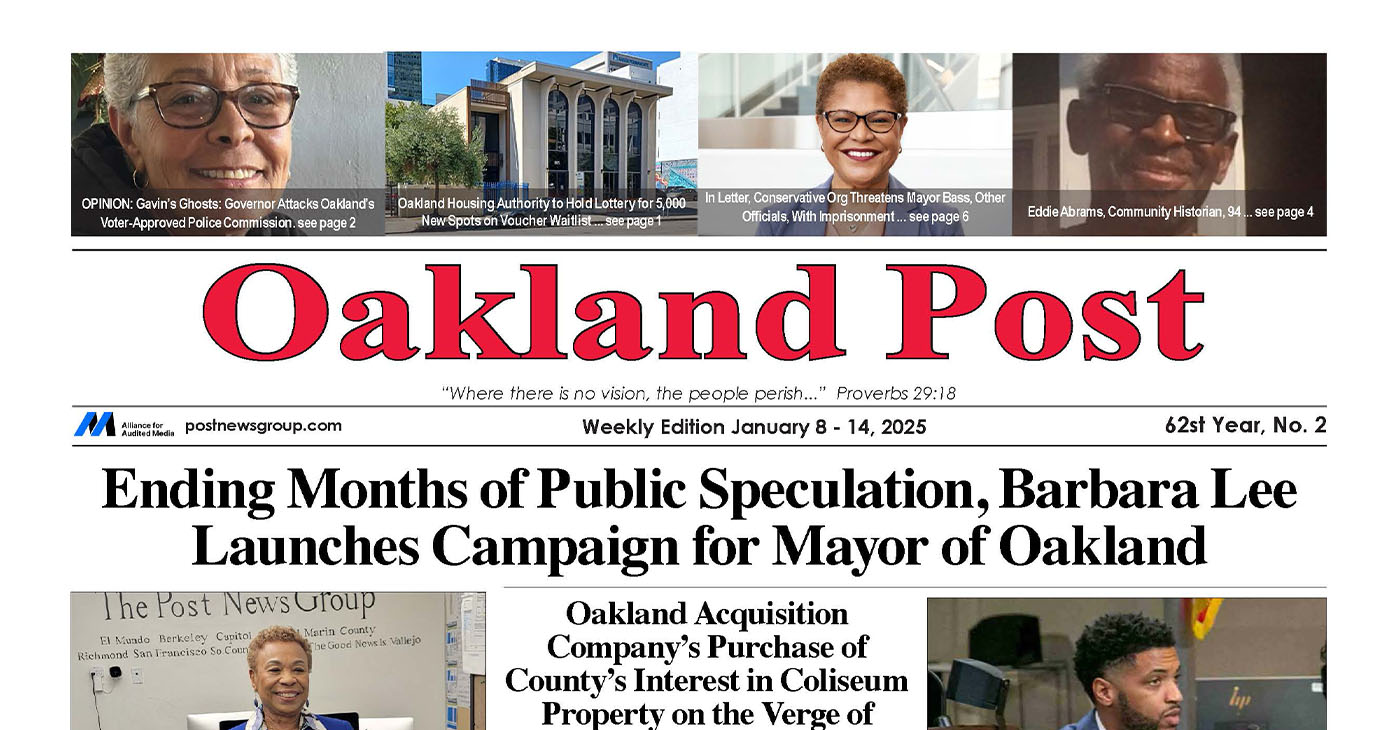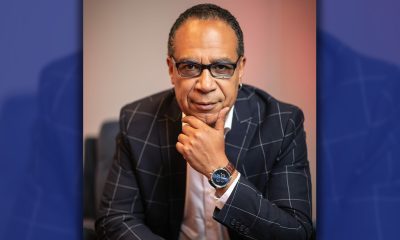Community
Bay Area Mayors, Advocates Urge Congressional Delegation to Make Historic Investments in Housing
Leaders Rally Around Long-term Solutions to Region’s Affordability Crisis

A coalition of elected leaders, private, and philanthropic partners sent a letter (http://ow.ly/DBuJ50FNGsX) to the region’s federal legislators on August 10 calling on them to include historic investments in affordable housing in the upcoming budget reconciliation legislation before Congress.
San Francisco Mayor London Breed, San Jose Mayor Sam Liccardo, and Oakland Mayor Libby Schaaf were joined by many of the region’s leading housing providers, advocates, and experts to urge California members of Congress to:
- Ensure anyone eligible for a housing voucher can get one by making vouchers a federal entitlement.
- Enact House Financial Services Chairman Maxine Waters’ Housing is Infrastructure Act of 2021, which would provide over $600 billion in affordable, equitable housing infrastructure; and focus resources in the region using flexible models such as the Bay Area Housing Finance Authority.
- Strengthen the Low-Income Housing Tax Credit program by increasing the number of credits, which would create over 330,000 new housing units in California.
This coalition stemmed from a regional effort to build on local economic recovery task forces and to align behind key priorities to rebuild and regrow a Bay Area where everyone can thrive. It recognizes that affordable housing is a critical priority to ensure an equitable recovery. The coalition noted:
“In the Bay Area and around California, our communities face an acute shortage of affordable housing, worsened by a pandemic that has further revealed the vast inequities, especially facing Black, Brown, Asian Pacific Islander, and Indigenous communities…”
“…Advancing these priorities will spur desperately needed affordable housing production and ensure all residents have access to a safe, affordable place to call home.”
A copy of the letter can be found at http://ow.ly/DBuJ50FNGsX, and the full text is included below:
The Honorable Dianne Feinstein, U.S. Senate,
The Honorable Alex Padilla, U.S. Senate,
The Honorable Nancy Pelosi, U.S. House of Representatives,
The Honorable Mark DeSaulnier, U.S. House of Representatives ,
The Honorable Anna Eshoo, U.S. House of Representatives,
The Honorable John Garamendi, U.S. House of Representatives,
The Honorable Jared Huffman, U.S. House of Representatives,
The Honorable Ro Khanna, U.S. House of Representatives,
The Honorable Barbara Lee, U.S. House of Representatives,
The Honorable Zoe Lofgren, U.S. House of Representatives,
The Honorable Jerry McNerney, U.S. House of Representatives,
The Honorable Jackie Speier, U.S. House of Representatives,
The Honorable Eric Swalwell, U.S. House of Representatives,
The Honorable Mike Thompson, U.S. House of Representatives
Re: Housing Priorities for the Bay Area Region
Dear Bay Area Congressional Delegation Members:
Thank you for your historic, ongoing leadership in providing critical resources to the nation – and the Bay Area – to recover from the health, economic, and housing consequences of the COVID-19 pandemic. We have come together across the private, public, and nonprofit sectors to work in collaboration toward a more equitable housing recovery in our region, home to over 7.7 million people, and look to your leadership in helping us secure key housing investments, which only the federal government can meet.
Cities and counties across the region convened local economic recovery task forces early in the pandemic, identifying local priorities and actions to provide immediate relief and advance local recovery strategies. To build on the work of the regional economic recovery task forces, a coalition of public, private, and philanthropic partners came together to identify our region’s most pressing state and federal priorities to ensure an equitable recovery. Common across the Bay Area was the recognition of affordable housing as a critical priority to ensure an equitable recovery.
In the Bay Area and around California, our communities face an acute shortage of affordable housing, worsened by a pandemic that has further revealed the vast inequities, especially facing Black, Brown, Asian Pacific Islander, and Indigenous communities. While there are numerous causes, millions of California families are housing insecure:
- Tens of thousands are homeless. In 2019, 35,028 individuals were experiencing homelessness in Bay Area counties.
- Overall, 137,500 households, including 86,600 low-income Bay Area households, are at risk of eviction and collectively owe $256 million in rent debt. If 10% of currently at-risk households became homeless, that would lead to a 44% increase in homelessness.
- The vast majority of renters who are behind on their rent have experienced job and income losses during the pandemic: 78% have lost employment income, while 81% earn less than $75,000.
- As of 2017, 71% of necessary permits were issued for above moderate-income units, compared with only 9% to 13% for either very low, low, or moderate-income units in the current 2015 to 2023 housing cycle.
- Due to generations of disinvestment, Black, Latinx, Native American, Mixed/other renters are more likely to be rent-burdened, particularly among female-headed renter households. Eighty-eight percent of renters who are behind on rent are people of color. Moreover, Black residents represent 29% of people experiencing homelessness in the region but only 6% of Bay Area residents.
As a coalition of leading housing providers, advocates, and experts working in the region, we are requesting that you fight on behalf of the following federal priorities that will directly improve millions of lives in the Bay Area:
- Transform the Housing Choice Voucher program into a federal entitlement so that every household that qualifies for assistance can receive it. We urge you to support House Financial Services Chairwoman Maxine Waters’ visionary effort to advance this goal through the inclusion of the Ending Homelessness Act of 2021 in reconciliation legislation this year. In addition to making vouchers an entitlement, the comprehensive Ending Homelessness Act of 2021 provides protections against discrimination based on source of income and funding for supportive services, creation of permanent affordable housing for people experiencing homelessness, and technical assistance for relevant state and local authorities. Together, these actions could end widespread homelessness as we know it.
- Invest in affordable housing in reconciliation legislation this year by including Chairwoman Waters’ Housing is Infrastructure Act of 2021, which would provide over $600 billion in housing infrastructure; and include in this flexible funding for innovative regional approaches for more equitable housing solutions. This transformational legislation would address the acute shortage of affordable housing and advance equity in the Bay Area and other parts of the country by investing in the creation and preservation of affordable and accessible housing, public housing, and community development, with set-asides for high and persistent poverty communities and measures that improve equitable planning and development processes to affirmatively advance fair housing. In addition, fully funding cross-jurisdictional solutions, such as the Bay Area Housing Finance Authority (BAHFA), within these programs will allow regions and metro areas across the country to elevate a commitment to racial equity, foster innovation to integrate housing solutions with regional transportation and climate strategies, and make each dollar invested in housing goes further than other piecemeal approaches would otherwise accomplish.
- Strengthen the Low Income Housing Tax Credit – a crucial tool in the production of affordable housing – by enacting the bipartisan, bicameral Affordable Housing Credit Improvement Act (AHCIA). Since its inception in 1986, the Low Income Housing Tax Credit (LIHTC) has built or rehabilitated more than 3.5 million affordable housing units, making it the most successful federal policy to produce affordable rental housing. We thank you for your support of this meaningful tax credit. Today, AHCIA is needed to expand its impact in order to meet the scope of the current affordable housing crisis. AHCIA would help build more than two million new affordable housing units across the country, including 330,000 in California alone, in the next decade by increasing the amount of credits allocated to each state by 50 percent, increasing the number of affordable housing projects that can be built using private activity bonds, and making improvements to the LIHTC to better serve victims of domestic violence, formerly homeless students, Native American communities, veterans, and rural Americans.
Advancing these priorities will spur desperately needed affordable housing production and ensure all residents have access to a safe, affordable place to call home. Thank you for contacting Christa Brown with the San Francisco Foundation so we can further discuss these priorities in the near future.
Sincerely,
| London Breed Mayor, City of San Francisco |
Sam Liccardo Mayor, City of San Jose |
Libby Schaaf Mayor, City of Oakland |
| Tomiquia Moss Founder & Chief Executive, All Home |
Margaret Peterson CEO, Catholic Charities East Bay |
Monique Berlanga Interim Executive Director, Centro Legal de La Raza |
| Malcolm Yeung Executive Director, Chinatown Community Development Center |
Don Gilmore Executive Director, Community Housing Development Corporation |
James W. Head President & CEO, East Bay Community Foundation |
| Michael McAfee President and CEO, PolicyLink |
Priscilla Almodovar President and CEO, Enterprise Community Partners |
Cindy Wu Executive Director, LISC Bay Area |
| Leslye Corsiglia Executive Director, Silicon Valley @ Home |
Guillermo Mayer President & CEO, Public Advocates |
Fred Blackwell CEO, San Francisco Foundation |
| Nicole Taylor President and CEO, Silicon Valley Community Foundation |
Amie Fishman Executive Director, Nonprofit Housing Association of Northern California |
Gloria Bruce Executive Director, East Bay Housing Organization |
| Ellen Wu Executive Director, Urban Habitat |
Alicia John-Baptiste President and CEO, SPUR |
Omar Carrera CEO, Canal Alliance |
| Debra Gore-Mann President and CEO, The Greenlining Institute |
Derecka Mehrens Executive Director, Working Partnerships USA |
Activism
Oakland Post: Week of January 8 – 14, 2025
The printed Weekly Edition of the Oakland Post: Week of January 8 – 14, 2025

To enlarge your view of this issue, use the slider, magnifying glass icon or full page icon in the lower right corner of the browser window.
#NNPA BlackPress
Supreme Court Decision Confirms Convicted Felon Will Assume Presidency
NNPA NEWSWIRE — In a 5-4 ruling, the court stated that Trump’s concerns could “be addressed in the ordinary course on appeal” and emphasized that the burden of sentencing was “relatively insubstantial” given that Trump will not face prison time. Chief Justice John Roberts and Justice Amy Coney Barrett joined the court’s three liberal justices in the majority, with four conservative justices dissenting.

By Stacy M. Brown, NNPA Newswire Senior National Correspondent
@StacyBrownMedia
The Supreme Court on Thursday rejected President-elect Donald Trump’s emergency request to block criminal proceedings in his New York hush money case, ensuring that a sentencing hearing will proceed as scheduled on Friday. The decision makes it official that, on January 20, for the first time in its history, the United States will inaugurate a convicted felon as its president.
In a 5-4 ruling, the court stated that Trump’s concerns could “be addressed in the ordinary course on appeal” and emphasized that the burden of sentencing was “relatively insubstantial” given that Trump will not face prison time. Chief Justice John Roberts and Justice Amy Coney Barrett joined the court’s three liberal justices in the majority, with four conservative justices dissenting.
Trump was convicted in May for falsifying business records related to a $130,000 payment to adult film star Stormy Daniels before the 2016 election. Manhattan District Attorney Alvin Bragg argued that the Supreme Court lacked jurisdiction to intervene in a state criminal case, particularly before all appeals in state courts were exhausted.
Trump’s legal team claimed the sentencing process would interfere with his transition to power and argued that evidence introduced during the trial included official actions protected under the Supreme Court’s prior ruling granting former presidents immunity for official conduct. Merchan, the New York judge who presided over the trial, ruled in December that the evidence presented was unrelated to Trump’s duties as president.
Prosecutors dismissed Trump’s objections, stating that the sentencing would take less than an hour and could be attended virtually. They said the public interest in proceeding to sentencing outweighed the President-elect’s claims of undue burden.
Justice Samuel Alito, one of the four dissenting justices, confirmed speaking to Trump by phone on Wednesday. Alito insisted the conversation did not involve the case, though the call drew criticism given his previous refusals to recuse himself from politically sensitive matters.
The sentencing hearing is set for Friday at 9:30 a.m. in Manhattan. As the nation moves closer to an unprecedented inauguration, questions about the implications of a convicted felon assuming the presidency remain.
“No one is above the law,” Bragg said.
Activism
Barbara Lee Launches Campaign for Mayor of Oakland
“At this critical moment, we must not be a city divided, but a community united,” she Lee. “If elected I will bring my hands-on leadership, new ideas and decades of experience in identifying billions in resources for our great city, so all residents and businesses are stronger and safer and our community has optimism and confidence in Oakland’s future.”

By Post Staff
Barbara Lee on Wednesday morning formally announced her candidacy for Mayor in Oakland’s April 15 special election.
“Time and time again, Oaklanders have faced our toughest obstacles by uniting to meet our challenges,” said Lee.
“At this critical moment, we must not be a city divided but a community united,” she said. “If elected, I will bring my hands-on leadership, new ideas, and decades of experience in identifying billions in resources for our great city so all residents and businesses are stronger and safer and our community has optimism and confidence in Oakland’s future.”
“As Mayor, I’ll address our homelessness crisis, prioritize comprehensive public safety and mental health services, and lead with fiscal responsibility to deliver the core City services residents and business owners deserve. Let’s do this – together.”
“I’ve never shied away from a challenge,” said Lee. “I’m always ready to fight for Oakland.”
Watch her campaign video here, which is online at BarbaraLee4Oakland.com
-

 Activism3 weeks ago
Activism3 weeks agoBooks for Ghana
-

 Arts and Culture4 weeks ago
Arts and Culture4 weeks agoPromise Marks Performs Songs of Etta James in One-Woman Show, “A Sunday Kind of Love” at the Black Repertory Theater in Berkeley
-

 Bay Area3 weeks ago
Bay Area3 weeks agoGlydways Breaking Ground on 14-Acre Demonstration Facility at Hilltop Mall
-

 Activism4 weeks ago
Activism4 weeks ago‘Donald Trump Is Not a God:’ Rep. Bennie Thompson Blasts Trump’s Call to Jail Him
-

 Activism3 weeks ago
Activism3 weeks agoLiving His Legacy: The Late Oscar Wright’s “Village” Vows to Inherit Activist’s Commitment to Education
-

 Arts and Culture3 weeks ago
Arts and Culture3 weeks agoIn ‘Affrilachia: Testimonies,’ Puts Blacks in Appalacia on the Map
-

 Alameda County3 weeks ago
Alameda County3 weeks agoAC Transit Holiday Bus Offering Free Rides Since 1963
-

 #NNPA BlackPress4 weeks ago
#NNPA BlackPress4 weeks agoCalifornia, Districts Try to Recruit and Retain Black Teachers; Advocates Say More Should Be Done
















































